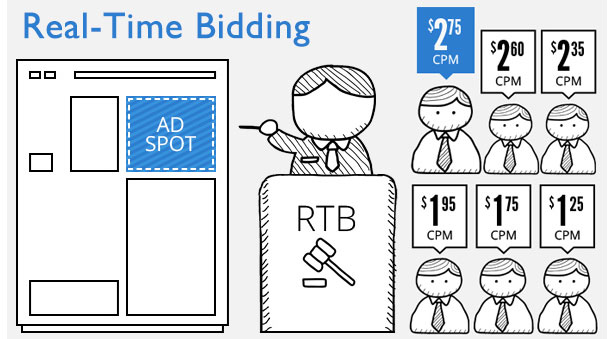How will the sanctions affect the Russian online advertising market?

The foreign policy situation in the world continues to be very tense, and many users of the RuNet continue to discuss how sanctions may affect various aspects of life in the country. This is a really interesting question, since sanctions and a crisis situation can have an impact even on areas where it has not been particularly expected - for example, in online advertising.
Current setting
Recently, a lot has been said that the conflicting parties have moved from symbolic and targeted sanctions to more serious sanctions - they were imposed on Russian companies and sectors of the economy, and foreign businessmen who were engaged in food-related businesses were also affected. for a year the authorities of our country banned.
')
Investors withdraw capital from Russia and are reluctant to invest in projects in our country. It becomes more difficult for financial institutions to get loans abroad. As a result, the general economic situation in the country is increasingly characterized not by the word “stagnation” (that is, lack of growth), but by the term “recession” (negative growth).
Crisis phenomena
In this situation, the revenues of many companies will fall, which means that they will reduce their advertising costs. The first victims of this trend are already there - this is Mail.Ru Group. The company published a report on financial indicators for the second quarter of 2014, from which it became clear that its revenue was less than the forecast of 280 million rubles (it amounted to 15.1 billion). The CEO and Chairman of the Board of Directors of Mail.Ru Group, Dmitry Grishin, said that the company's revenue would be less than the forecast by 4-8% - the worst figure since 2008.

A top manager of the company attributed the drop in indicators in the first half of the year to the complication of the economic situation and geopolitical situation:
These factors negatively affected our revenue from advertising, especially from the media one, which decreased by 10% in the second quarter.
Possible trends
The situation in the economy and the advertising market will lead to the fact that advertising budgets, by and large, will be reduced. Smaller advertisers may begin to abandon a variety of creative ad placements in the fall, large companies probably will not cancel contracts already budgeted for, but spending for 2015 will be actively reviewed.
As a result, we will be able to observe several trends in online advertising:
- Reducing the cost of branding advertising - "brand awareness", which was needed by the business at a time when "everything was fine", will not be needed against the background of a real drop in sales and income.
- Television content will begin to penetrate more actively into online channels and will want to save profits and capture new niches (the First Channel video will be broadcast on Rambler & Co sites).
- Reducing sales will push advertisers to use "selling" advertising - the obvious option here is contextual advertising.
- The transition to "performance-marketing", that is, marketing aimed at a specific result - the sale or the commission of the target action by the user.
- Based on this, it is logical to predict the growth in the use of advertising by real-time auction technology (Real-time Bidding, RTB), as a cheaper option than display advertising (banners), sold directly by Internet sites.
What with RTB
Let's talk a little more about RTB, which is one of the most promising advertising technologies - with its help, Internet sites (“publishers”) can sell banner placement on their resources through special advertising exchanges, where advertisers automatically bargain for the best placement price. The advertising robot wins, offering the best price for a specific banner placement. The whole process is fully automated.

RTB is a good means to attract targeted traffic to the site - an advertising robot determines the prospects for placing a banner based on the impersonal information about visitors to a specific Internet site (demographics, income, online activity history, social network profiles, etc.) received from different sources - in this way, the system can only spend money on displaying banners to the most promising users.
This does not make an advertising auction a substitute for contextual advertising - such ads are shown to users who are already looking for a specific product or service on the social network, and banner advertising (which includes RTB) helps to make the user want to search for this product. However, in the conditions of crisis and RTB in view of the opportunities for targeting and searching for the target audience, some advertisers will begin to be seen as a definite alternative to contextual advertising, which may also contribute to the increased use of this technology.
More options
It is impossible not to note the current policy of the authorities to strengthen the regulation of the Internet and the isolation of the runet from foreign segments - this is facilitated by the requirements for social networks to provide data at the request of Roskomnadzor to determine the popularity of bloggers (to comply with the relevant law), as well as the requirements for foreign Internet companies to store data Russians on servers in our country.
On the Russian online advertising market, and in particular, its RTB segment, there are several foreign players (Google can be recalled), Yandex has concluded partnerships with some of them. We can not exclude the distribution of requirements for data processing of Russians, which are used for advertising (albeit impersonal), exclusively by Russian companies - to improve security. In the short term, this may also bring some benefit to Russian advertising companies.
Strengthening control over the runet, will lead to slower growth in this market of foreign players, and can provide advantages to domestic - subject to certain conditions. In particular, many analysts say that the withdrawal of the founder of Yandex Arkady Volozh from the post of general director of the company was carried out precisely with the aim of reducing possible pressure from the state. If this is true, then the search engine will have the opportunity in a relaxed atmosphere to take up the fight against foreign competitors in the domestic market.
Posts and related links:
Source: https://habr.com/ru/post/234641/
All Articles